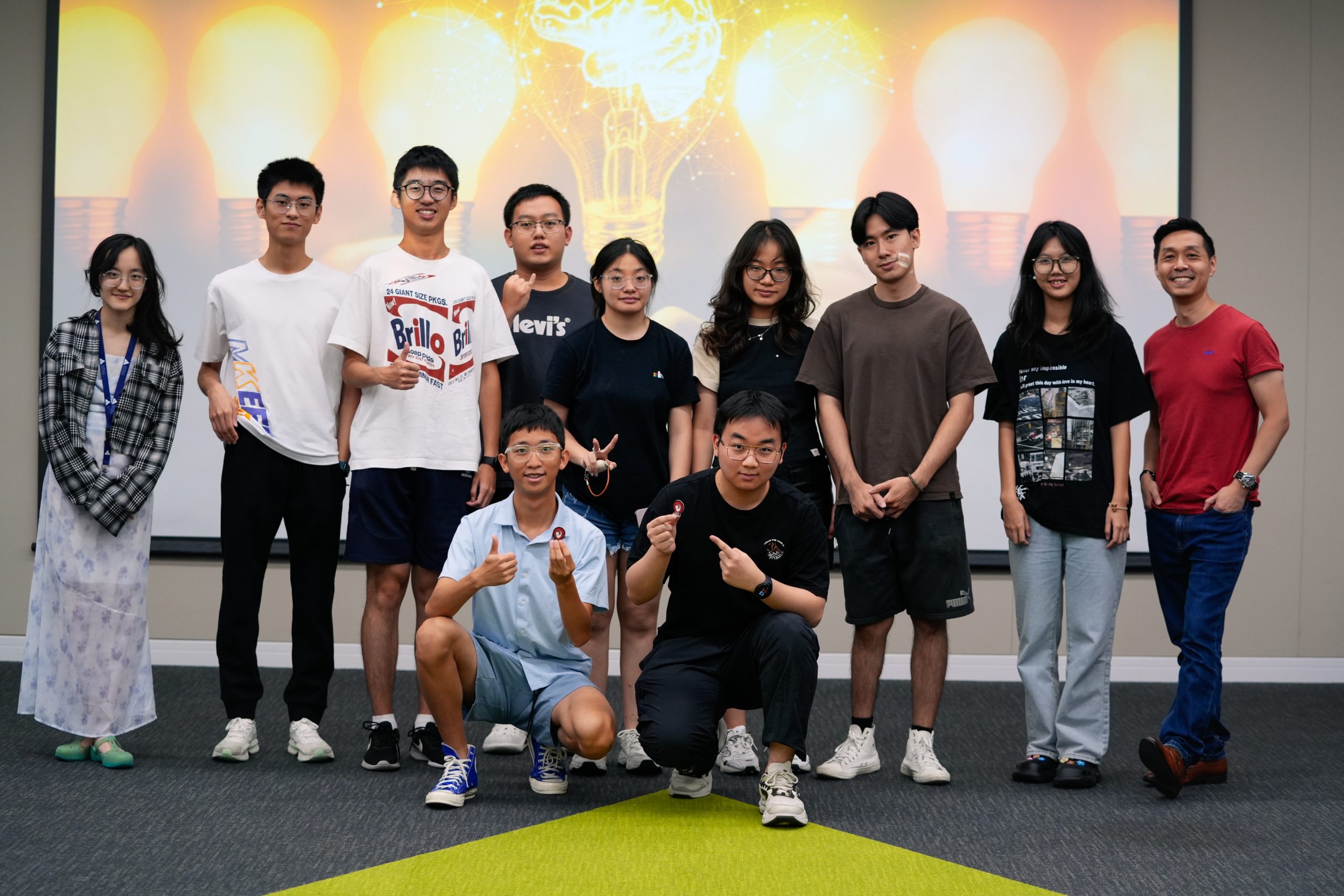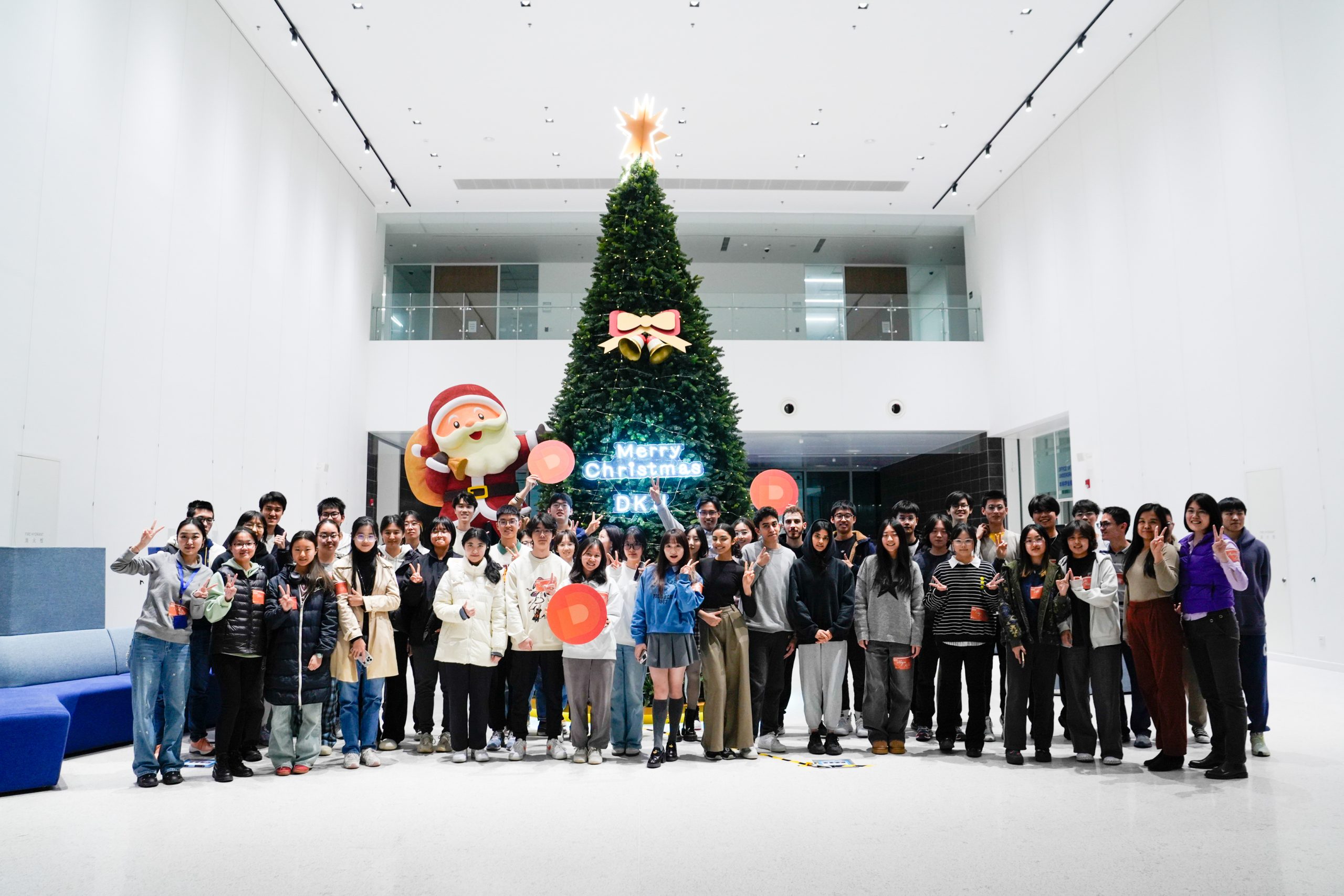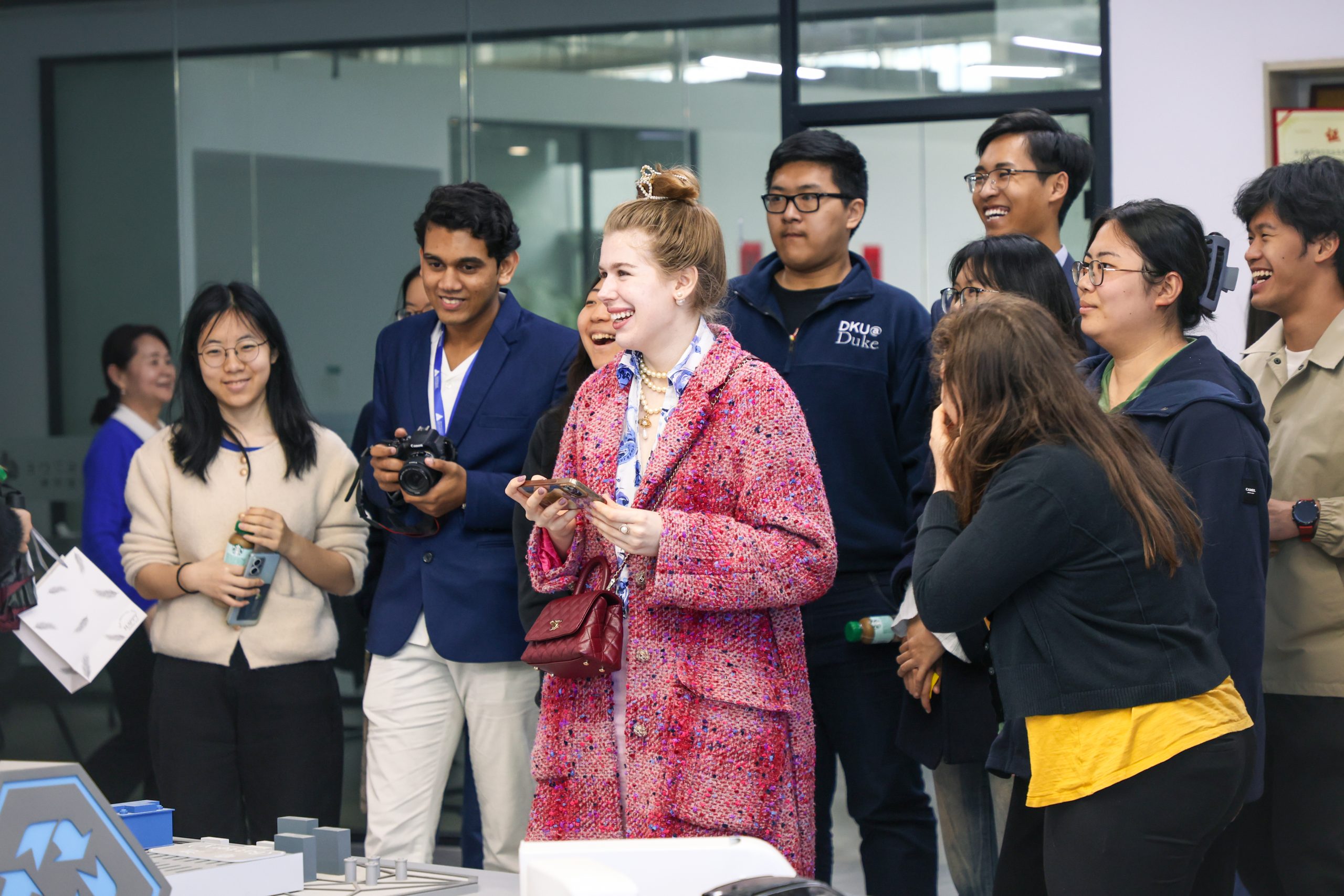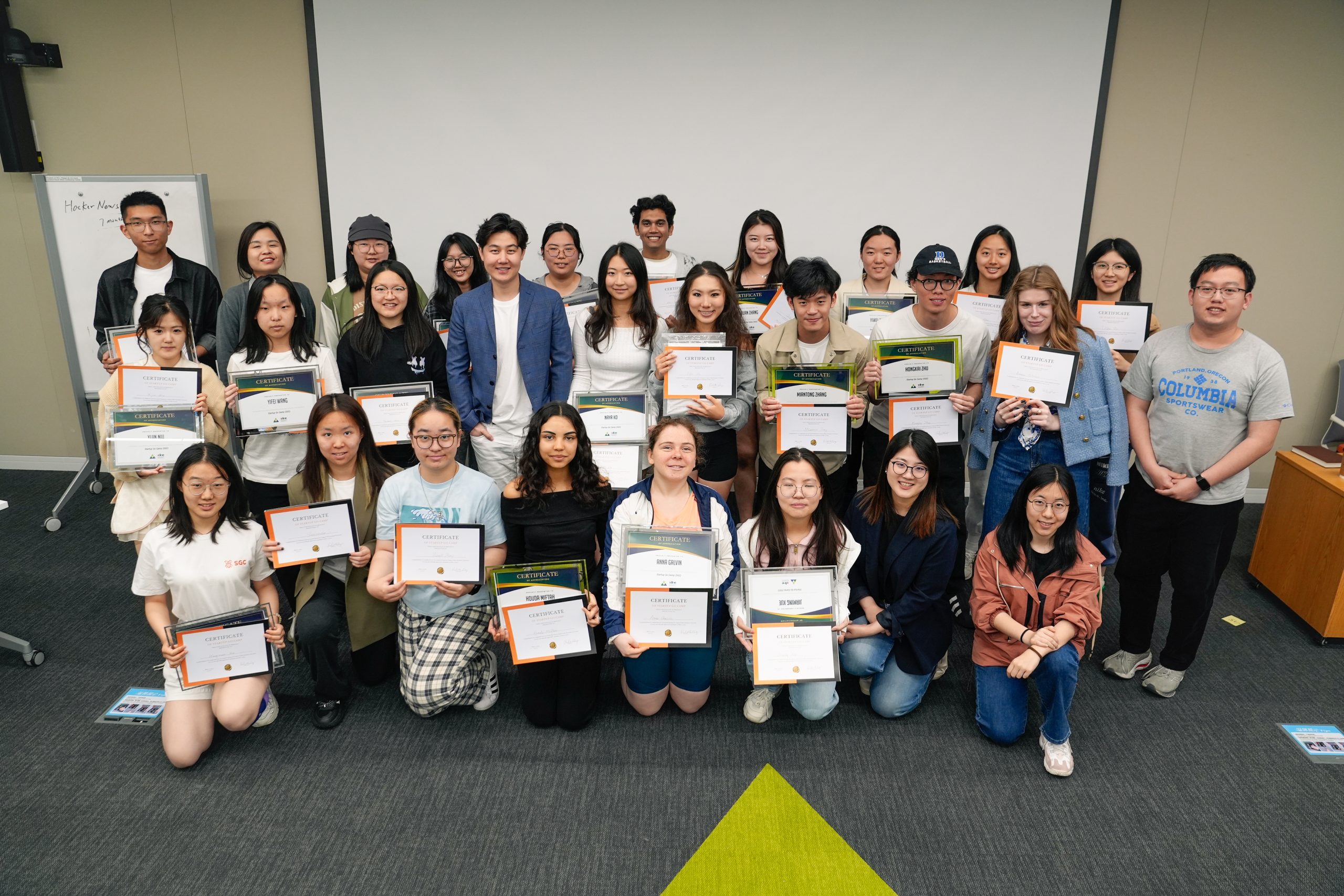PROJECTS CATALYZED
* Data as of December 2024

* Data as of December 2024
* Based on the 2024 Program Survey
* Data as of January 2025
We proudly present the DKU Innovation Challenge Season 4, themed “Innovation With Uncertainty” – a bold exploration of how innovative thinking thrives in ambiguous environments. This season challenges participants to reframe uncertainty as a catalyst for breakthrough solutions, reimagine possibilities where constraints spark creativity, and risk becomes a strategic ally. It demands iterative prototyping, cross-disciplinary agility, and ethical foresight to transform unpredictable variables into competitive advantages.
Winning projects will gain direct access to the 2025 (Dachuang) College Student Innovation and Entrepreneurship training Program Cohort II under the DKU Innovation Incubator (Dii), with funding up to 50,000 RMB and tailored mentorship for high-potential ventures. Open to all enrolled DKU students, this initiative supports interdisciplinary teams aiming to turn unpredictable conditions into strategic advantages.
This track focuses on creating scalable, adaptable solutions that tackle complex challenges across various domains. Participants are encouraged to explore areas such as artificial intelligence, machine learning, blockchain, Internet of Things (IoT), and renewable energy technologies.
This track emphasizes innovation aimed at fostering societal resilience and addressing pressing social challenges in uncertain times. Participants are encouraged to design programs, platforms, or systems that promote equity, inclusion, and well-being.
Leverage creativity to navigate ambiguity and inspire positive change. This track encourages participants to use creative mediums—such as visual arts, music, literature, or performance—to address complex problems and the uncertain environment.
The Open Track welcomes projects from any discipline that demonstrate originality and potential for impact in uncertain contexts. This flexibility allows participants to propose solutions that may not fit into traditional categories but still address critical issues with innovative approaches. It encourages out-of-the-box thinking and cross-disciplinary collaboration.
This track features projects proposed by DKU professors. Students are encouraged to proactively reach out to professors whose projects align with their interests, forming project teams under faculty guidance. This approach aims to foster student-faculty collaboration, leveraging academic expertise to develop innovative solutions.
Select faculty-proposed projects that interest you, submit your Resume and a Motivation Letter through the application link, and we’ll forward your materials to the relevant professors for consideration.
daniel.weissglass@dukekunshan.edu.cn
Brief description of the project: This project aims to create a video game which provides users with an opportunity to practice basic skills of applied ethical reasoning. This project aims to create a simple game interface, powered by generative AI (esp. Large Language Models) to allow students to practice ethical reasoning asynchronously in a way that is appropriately flexible and provides constant opportunities for growth. This system will leverage these tools to create virtual debate partners and advisors, informed by moral theory and applied ethical frameworks (e.g., the Markulla Center Framework), with which players can interact in an asynchronous way.||Ethical reasoning is a vital skill, and engaging a gamified approach can help students practice moral reasoning. However, the flexibility of ethical reasoning, and the wide set of considerations that should and could be made in a given case makes it difficult to engage in a scalable model of gamification. On the one hand, we could engage role playing games, which depend on students to push one another – adding a game structure to class discussion – which is flexible but depends on student ability and is typically confined to class time. On the other hand, we can try to make use of video game structures, which enables asynchronous play and may engage levels of knowledge beyond that available to the typical student but lacks flexibility – and is often limited by the imagination of the game designer in ways that leave important moral considerations aside. The integration of LLMs into a gamified system should provide a valuable opportunity to use emerging technologies to satisfy ancient goals of education, and to enable a depth of ethical learning that is hard to achieve even in the most focused classrooms.
Expected outcome(s): A prototype game; possible research reports if product moves quickly enough.
bing.luo@dukekunshan.edu.cn
Brief description of the project: The potential of intelligent devices and massive data in our increasingly connected world. Traditional data-driven AI technologies often require collecting and centralizing data from local devices to a central data center (cloud), which raises not only communications latency but also significant data privacy concerns, such as data misuse and leakage.||To overcome these challenges, DKU Edge Intelligence lab have recently developed “”FedCampus””(https://www.bilibili.com/video/BV1da4y197ne/?spm_id_from=333.337.search-card.all.click&vd_source=2875c1b6924ebce8288c9039f69952ce), a privacy-preserving data platform designed for the smart DKU ecosystem. The platform incorporates cutting-edge privacy-preserving technologies, e.g., federated learning (FL) and federated analytics (FA). FedCampus aims to learn and provide statistical and insightful information in DKU community such as heavy-hitters (aka popular words/emoji/music) and healthcare data (sleeping/exercising patterns), yet, without collecting/knowing individual private information.||In the year 2025, FedCampus will continue to explore new functionalities in our APP for more intelligent applications for DKU community. Therefore, we welcome students who are interested in data mining/analytics, collaborative AI, and mobile/IoT system development. Edge Intelligence lab provides computers, smart phones, smart watches, CPU/GPU IoT devices, DJI UAVs, mobile robotics, and WiFI/4G/5G networked communications systems.
Expected outcome(s): 1. System demo and smart application 2. Patent and paper submission/publication
bing.luo@dukekunshan.edu.cn
Brief description of the project: As Large Language Models (LLMs) and reinforcement learning (RL) continue to revolutionize robotics, a critical challenge arises in bridging the gap between the relatively slow inference speeds of LLMs (around 5 Hz) and the high-frequency control demands (>50 Hz) for agile UAV. This project aims to develop and integrate a novel framework that leverages the strategic, higher-level reasoning capabilities of LLMs with the fast, low-level control policies provided by RL. By combining these approaches, we seek to enable UAVs to perform dynamic tasks such as high-speed navigation and cooperative inspection with enhanced adaptability and precision.||Technically, the project will encompass:|1. Simulation Environment & Training Pipeline: A high-fidelity simulation setup to train RL policies under diverse conditions, guided by LLM-derived objectives and reward functions.|2. Real-World Feedback Loop: Mechanisms to continually refine the drone’s control policies through real-world performance data, ensuring adaptive and robust maneuvers.|3. System Integration: Implementation of a hybrid control architecture where LLMs handle strategic planning and natural language directives, while RL handles time-critical maneuvering.||From a research standpoint, this work is innovative in its combination of state-of-the-art LLM with reinforcement learning for real-time robotic control.
Expected outcome(s): 1. Research Report / Publication: Documenting the design, implementation, and performance evaluation of the integrated LLM-RL system.|2. Prototype / Proof-of-Concept: A functioning aerial robot demonstration showcasing agile maneuvers and cooperative inspection capabilities.
bing.luo@dukekunshan.edu.cn
Brief description of the project: The purpose of our project is to enhance the Duke Kunshan University (DKU) community’s access to accurate and campus-specific information through an AI-powered assistant tailored to the unique needs of students, faculty, and staff. While general-purpose AI tools provide a wide range of functionalities, they often lack the depth and specificity required for navigating the intricacies of university life, from course selection to cafeteria menus and academic policies.||ChatDKU (demo video on YouTube and BiliBili), developed by our DKU Edge Intelligence Lab, addresses this gap by leveraging a retrieval-augmented generation (RAG) pipeline and a memory-enhanced cyclic agent architecture to provide contextually relevant and precise information. Unlike traditional AI systems that rely on centralized and potentially less secure cloud-based data solutions, ChatDKU’s knowledge base is sourced exclusively from official DKU web pages and documents. All data and AI models are hosted securely on DKU’s local servers, ensuring robust data security and privacy.||In 2025, we aim to enhance ChatDKU’s impact on the DKU community through targeted collaborations and technical advancements. We will deepen our partnership with the Undergraduate Academic Advising Office to optimize advising-specific responses and integrate the DKU Library’s API to enable book search queries. On the technical front, we will refine ChatDKU’s performance, enhance DevOps practices, and establish a telemetry system for ChatDKU components.
Expected outcome(s): 1. system demo, and LLM applications|2. patent and paper submission/publication|
mustafa.misir@dukekunshan.edu.cn
Brief description of the project: The complex optimization problem presented by the Integrated Healthcare Timetabling Competition 2024 (https://ihtc2024.github.io/) is to be tackled in this project. This international competition is linked to the EURO 2025 academic conference (the 34th European Conference on Operational Research, https://euro2025leeds.uk/) and is organized by the University of Udine (Italy) and KU Leuven (Belgium). The problem, which combines surgical case planning, patient admission scheduling, and nurse-to-room assignment, is to be implemented under the existing HyFlex framework. Various state-of-the-art (SOTA) hyper-heuristic algorithms will be utilized to solve the problem, and their performance will be evaluated. Submission to the competition by April 1, 2025, is planned, if time permits.||A comprehensive experimental analysis is to be conducted, and the results are to be presented in an academic article. The main objective of the project is to achieve improved robustness through Cross-Domain Algorithm Selection (CdAS), an automated algorithm selection system that can identify the most appropriate hyper-heuristic to solve each given problem instance, thereby optimizing the performance of the system. The project plan involves the following steps: (1) implementation of the Integrated Healthcare Timetabling problem under the HyFlex framework, (2) testing and evaluation of existing SOTA hyper-heuristics on the problem, and (3) development of a CdAS system that identifies a series of target problem features to further improve the performance and robustness of the hyper-heuristics.
Expected outcome(s): The expected outcomes of the project include a functioning system and a thorough analysis of the results. Although submission to the competition is planned, the primary goal of the project is to produce a high-quality academic paper that presents the findings and contributes to the advancement of research in integrated optimization problems and healthcare timetabling. Upon completion, the project is expected to provide valuable experience in solving complex optimization problems, working with hyper-heuristics, and applying CdAS, with potential applications in real-world healthcare settings. Finally, a user-friendly interface is to be designed and implemented to demonstrate the functionality of the system, providing a product prototype that showcases the optimization capabilities of the developed system.
Fang-Fang Yin – Professor of Medical Physics
fangfang.yin@duke.edu
Brief description of the project: The aim of this project is to build a medical puncture device that integrates a complete software design, whose software system not only includes the embedded bottom layer control (hardware driver, real-time communication, data acquisition and pre-processing), but also covers the development and integration of top layer intelligent algorithms (Deep Reinforcement Learning, Adaptive Control, Model Predictive Control). Through the collaborative work of hardware and software, it realizes high-precision and real-time adaptive control of the puncture robotic arm, and ultimately improves the safety and success rate of the puncture operation.
Expected outcome(s): Prototype medical puncture device: A prototype device that integrates a robotic arm (consisting of a motor and slide) with an embedded control system. The prototype will have: High precision puncture capability; Intelligent control algorithms; Modular design; User interface and data monitoring; Embedded and software systems; Possible academic publication: The application of hardware and software cooperative control in medical puncture device; Research on adaptive control strategy based on deep reinforcement learning; Exploration of model predictive control in real-time medical operation; Experimental validation and performance evaluation of medical puncture devices. Patent Achievements: Device structure patent; control algorithm and software system patent; data communication and real-time control patent.
Fang-Fang Yin – Professor of Medical Physics
fangfang.yin@duke.edu
Brief description of the project: Relying on the overall solution of medical puncture robotic arm, this project focuses on the design and optimization of the mechanical structure level, aiming to improve the precision, stability and safety of the device. The main research content includes: Mechanical structure design and optimization: Using advanced CAD software for the overall design of the robotic arm, the initial conception of the structure consisting of multiple sets of motors and slide rails; combined with Finite Element Analysis (FEA), verification and optimization of the structure’s strength, stiffness, and heat transfer and other indicators, to ensure that the actual puncture process meets the requirements of high-precision and reliability. Multi-body dynamics modeling: Construct a multi-body dynamics model of the puncture robotic arm to analyze the kinematics and dynamics characteristics during puncture, positioning and dynamic operation, including the interactions between the joints, force distribution and vibration response. Optimize the key parameters through simulation testing to achieve smoothness of the motion trajectory and real-time response. Digital twin technology application: Establish a digital twin platform corresponding to the physical robotic arm, collect real-time device working data, and monitor and predict the state of the robotic arm through virtual-real mapping. The use of digital twins to achieve virtual testing, design iteration and fault diagnosis, providing data support and decision-making basis for the optimization of the overall system.
Expected outcome(s): Academic Papers and Conference Papers: Write papers on mechanical structure optimization, dynamics modeling, and the application of digital twins in medical puncture robotic arms; Prototyping: Produce a preliminary prototype of the robotic arm, including key structural components, transmission system and basic sensor interfaces, to verify the feasibility of the design scheme; construct a virtual-reality fusion system based on the digital twin platform to realize real-time monitoring and dynamic simulation. Intellectual Property Achievements: Write technical documents and apply for patents for key technologies such as mechanical structure design, dynamic modeling, digital twin data processing and system integration.
Luyao Zhang – Assistant Professor of Economics
luyao.zhang@dukekunshan.edu.cn
Brief description of the project: This project harnesses cutting-edge technologies-drone photography, generative artificial intelligence (AI), and emerging digital media tools-to address global challenges while empowering the creative economy for social good and sustainability. The project focuses on producing innovative cultural products such as multimedia art, interactive websites, graphic design, and digital displays that highlight global heritage, biodiversity, and cultural preservation. It also aims to develop sustainable financial models for cultural products, blending social entrepreneurship with technological innovation to ensure long-term societal impact. Through interdisciplinary collaboration, students will explore how technology can reduce the cost of public engagement with cultural heritage and environmental protection, fostering a deeper connection between humanity, technology, and sustainability. Through an interdisciplinary approach, this project will cultivate cultural awareness, environmental stewardship, and innovative solutions that contribute to the Sustainable Development Goals (SDGs), particularly focusing on Quality Education (SDG 4), Decent Work and Economic Growth (SDG 8), Sustainable Cities and Communities (SDG 11), and Climate Action (SDG 13).
Expected outcome(s): 1.Sustainable Cultural Products and Financial Models: Creation of digital cultural products that blend tradition and modern technology; Development of sustainable financial models such as crowdfunding, revenue-sharing, and social enterprise models for long-term viability. 2. Global Awareness and Community Engagement: Broader public engagement with cultural heritage and environmental issues through immersive multimedia experiences; Increased awareness of global cultural diversity and biodiversity protection. 3. Professional Growth and Global Opportunities: Students will gain unique opportunities to enhance their academic and professional profiles, preparing them for leadership roles in creative industries and technology-driven social enterprises: Engagement with Global Entrepreneurship and Leadership Opportunities: Collaboration with industry leaders such as Microsoft, Amazon, Alibaba, Tencent, Baidu, and others; Participation in AI4All Initiatives: Fostering a spirit of inclusivity and innovation while contributing to global efforts to shape ethical and sustainable AI standards; Academic Achievements and Recognition: Opportunities for co-authored publications, conference presentations, and international collaborations; Global AI Standard-Setting and Policy Influence: Participation in working groups and forums for global AI standards and sustainable technology development. 4. Student Capacity Building and Hands-On Experience: Skill development in emerging technologies (generative AI, drone photography, interactive media design) and sustainable business model creation; Strengthening interdisciplinary research, entrepreneurship, and creative problem-solving abilities.
Luyao Zhang – Assistant Professor of Economics
luyao.zhang@dukekunshan.edu.cn
Brief description of the project: The AI for Science of ALL project aims to build an AI-driven automated research workflow and a sustainable economic model that lowers both the technical and financial barriers to scientific discovery. This initiative seeks to make cutting-edge research tools accessible to a broader, more diverse community of scholars-early-career researchers, underrepresented groups, educators, and citizen scientists-allowing them to participate in scientific innovation without needing extensive computational expertise or substantial funding. The platform will integrate machine learning, automated data analysis, and experimental design tools to facilitate scientific research in fields such as biology, chemistry, physics, and environmental science. The accompanying sustainable economic model will ensure that this platform remains accessible through cost-sharing systems, open-access tiers, and collaborative funding initiatives. This approach reduces financial barriers while enabling users to partake in the joy of scientific discovery without prohibitive costs. Guided by the Responsible AI framework, FAIR (Findable, Accessible, Interoperable, Reusable) Data Principles, and CARE (Collective Benefit, Authority to Control, Responsibility, and Ethics) Principles, this project ensures that data sharing and research practices are transparent, inclusive, and ethical.
Expected outcome(s): 1. Democratize Scientific Discovery and Research: Develop a user-friendly AI platform that enables researchers from all backgrounds to engage in advanced research. Lower the technical and financial barriers for participation, promoting equity and broad access. Foster inclusive innovation inspired by AI4All, encouraging diversity in AI-driven science. 2. Build a Sustainable Economic Model for Open Science: Develop a tiered access system with open-access tools for basic research needs and premium features for advanced applications. Create a cost-sharing model where institutions and research communities can collaborate to reduce individual costs. Launch collaborative grant programs and sponsorship models to support scholars from underfunded institutions. 3. Accelerate Discovery with AI and Automation: Leverage AI to automate labor-intensive processes such as data analysis, literature review, and predictive modeling. Develop real-time research collaboration tools to promote interdisciplinary discovery. 4. Ensure Ethical, Transparent, and Responsible Research Practices: Align data management and governance with FAIR and CARE Principles, ensuring ethical use of data and equitable knowledge sharing. Mitigate AI biases and promote explainability in scientific research workflows.
* Since the project already has members, recruitment is not open.
Rui Liu – Assistant Professor of Chemistry
rui.liu454@dukekunshan.edu.cn
Brief description of the project: This research focuses on the efficient collection of experimental organic photoredox catalyst property data (e.g., ground- and excited-state redox potentials, excited-state lifetime, chemical and photostability) and catalytic performance from scientific literature to address the challenges of accessing hard-to-find data and improving the quality of information available for machine learning studies in light-driven photoredox catalysis. Utilizing a chain of advanced large language models (LLMs), we will develop a systematic approach to extract and organize organic photoredox catalyst data into a structured format. Our goal is to create a comprehensive and ready-to-use dataset. Subsequently, we will use the curated database to train AI models capable of predicting key properties of novel organic photoredox catalysts, aiding in the design of new catalytic systems for challenging chemical transformations. Through machine learning, we also plan to identify relationships between catalytic performance (i.e., yields and selectivity) and the properties of selected photoredox catalysts. More importantly, we aim to develop a reliable, data-driven Photoredox Catalysis Chatbot to recommend optimal photoredox catalysts for specific chemical reactions based on the provided reactants, light source, and reaction conditions. This chatbot will serve as a practical tool to refine synthesis strategies. We anticipate that the Photoredox Catalysis Chatbot will be highly beneficial across various subdisciplines of chemistry.
Expected outcome(s): – Publication of research on Data or AI-driven for predicting key properties of novel organic photoredox catalysts. – Develop a reliable, data-driven Photoredox Catalysis Chatbot. – Participation in national and international conferences to give oral and poster presentations.





The Dachuang Program is a significant initiative in China, jointly implemented by nine key ministries and institutions, including the Ministry of Education and the Chinese Academy of Sciences. Its primary goal is to foster innovation and entrepreneurship among college students.
At Duke Kunshan University (DKU), the DKU Innovation Incubator (Dii) supports student-led projects participating in the Dachuang Program. Dii provides funding for students engaged in innovative research, creative pratices and entrepreneurial activities, guided by faculty and industry experts. These projects can evolve into independent studies and signature work, contributing to students’ academic and professional development.
The project system is also divided into three levels: Institutional-level Projects, Provincial-level Projects, and National-level Projects (recommended). National-level Projects are recommended to the Ministry of Education by the Jiangsu Education Department (JED), and National-level Projects not approved by the Ministry of Education are implemented with reference to Provincial-level Projects. National programs provide key areas of support. Specific application requirements and key areas are based on the program guidelines issued by the Ministry of Education every year.

DKU iNNOVATION iNCUBATOR (Dii) is the DKU Innovation and Entrepreneurship Initiative (InE) flagship program. It serves as an engine for cultivating and supporting startup ideas from across the DKU campus. We aim to leverage the dynamism and enthusiasm of young change-makers striving to have a positive impact on the world with their unique ideas and innovative products and services.